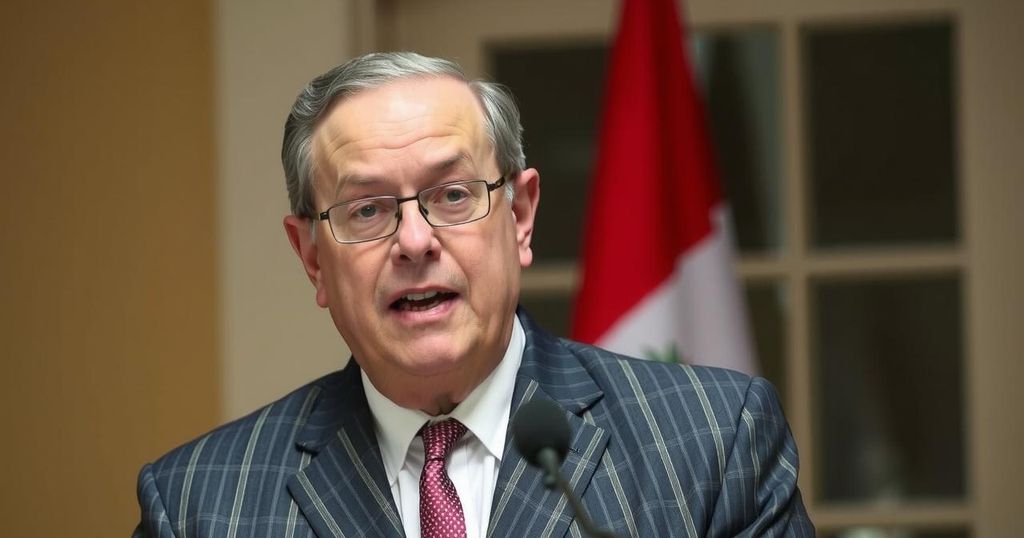Lebanon’s Prime Minister Najib Mikati has called on the US and France to expedite the withdrawal of Israeli forces from Lebanon, emphasizing the importance of resolving disputes along the Blue Line. Mikati expressed deep concern over the destruction caused by the recent conflict, pledging to seek international support for reconstruction efforts as the Lebanese army prepares for deployment following the recent ceasefire agreement.
Lebanon’s caretaker Prime Minister, Najib Mikati, has urged the United States and France to facilitate a swifter withdrawal of Israeli forces from Lebanese territory, a request emphasized amid an ongoing, delicate ceasefire between Israel and Hezbollah. Mikati affirmed his dedication to addressing disputes related to the Blue Line, the United Nations-delineated boundary between Lebanon and Israel, with the goal of eliminating grounds for the Israeli military presence in Lebanon.
Mikati visited the southern frontlines for the first time, where the deployment of Lebanese troops is anticipated as part of the recent US-brokered ceasefire agreement. He announced efforts to establish a reconstruction trust fund in collaboration with various international partners to address the damage inflicted on Lebanon, noted to be approximately $3.4 billion by the World Bank in early October.
During his tour, which included an assessment of destruction in the border town of Khiam, Mikati conveyed his sorrow over the extensive devastation and reaffirmed the necessity of an immediate Israeli withdrawal. He stated, “These are essential issues for the Lebanese army to be ready to carry out its duties in full. The measures related to UN Resolution 1701 will take their natural course and be fully implemented by the army, with American and French guarantees.” He emphasized that the responsibility to implement international resolutions lies with the Lebanese government, which remains committed to fulfilling its obligations under international law.
As concerns about delays in the Israeli withdrawal surfaced, Mikati criticized Israeli reluctance, seeking a resolution with aides from France and the United States to hasten the process. Additionally, he affirmed the Lebanese army’s unwavering readiness to perform its duties and the importance of discussing deployment arrangements at an oversight committee meeting scheduled with international military representatives. Mikati expressed hope for effective collaboration that prioritizes national unity and stability.
Mikati’s visit garnered considerable local support as he acknowledged the sacrifices of military personnel during their service. He praised the resilience of the army and its vital role in upholding national defense. The visit encompassed inspections of the Lebanese Armed Forces and coordination discussions with United Nations Interim Force in Lebanon (UNIFIL) officials, reinforcing the importance of successfully implementing Resolution 1701 and achieving long-term stability in southern Lebanon. Concurrently, provocations from Israeli forces, including the display of flags and continued airspace violations, highlight ongoing tensions in the region that must be addressed to foster lasting peace.
This article centers on Lebanon’s political landscape following a period of hostilities between Israel and Hezbollah, heightened by the recent ceasefire agreement. The ceasefire has introduced a framework for the gradual withdrawal of Israeli troops from Lebanon and the anticipated deployment of Lebanese forces. The article focuses on Prime Minister Najib Mikati’s diplomatic efforts to expedite this withdrawal and foster reconstruction initiatives, underscoring the regional complexities and the role of international actors, particularly the United States and France, in mediating the situation. It also highlights the ongoing challenges faced by the Lebanese military and community in addressing the aftermath of conflict and pursuing national sovereignty.
In conclusion, Prime Minister Najib Mikati’s calls for support from the US and France illustrate the critical need for a swift Israeli withdrawal from Lebanese territory in alignment with international resolutions. His commitment to reconstructing war-torn areas reflects the dual focus on immediate military concerns and long-term socio-economic recovery. The ongoing complexities, including Israeli military provocations and the overarching quest for stability, indicate that collaborative efforts are essential for a peaceful resolution and enduring stability in the region.
Original Source: www.arabnews.com






